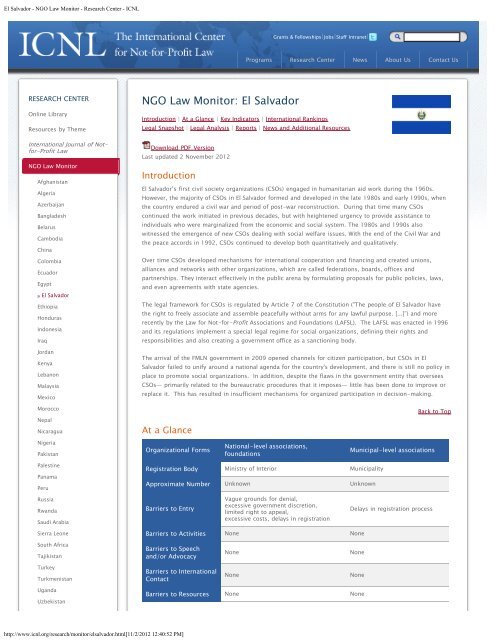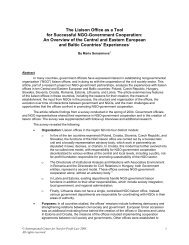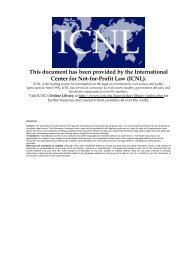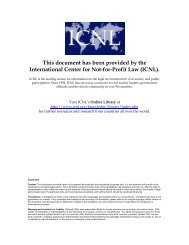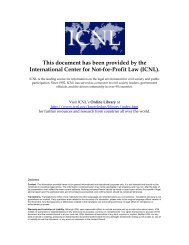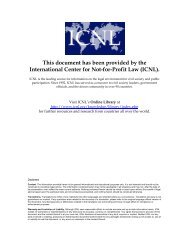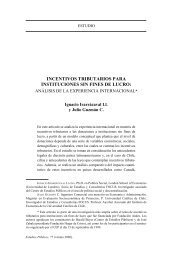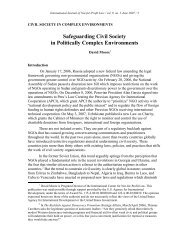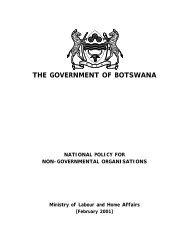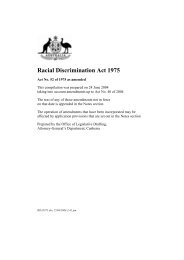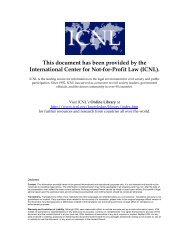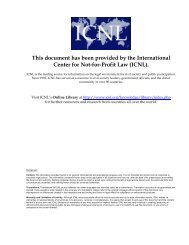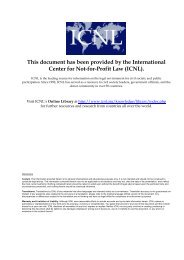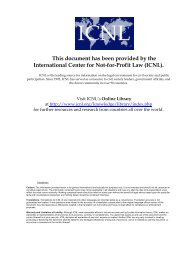El Salvador - NGO Law Monitor - Research Center - ICNL
El Salvador - NGO Law Monitor - Research Center - ICNL
El Salvador - NGO Law Monitor - Research Center - ICNL
You also want an ePaper? Increase the reach of your titles
YUMPU automatically turns print PDFs into web optimized ePapers that Google loves.
<strong>El</strong> <strong>Salvador</strong> - <strong>NGO</strong> <strong>Law</strong> <strong>Monitor</strong> - <strong>Research</strong> <strong>Center</strong> - <strong>ICNL</strong><br />
RESEARCH CENTER<br />
Online Library<br />
Resources by Theme<br />
International Journal of Notfor-Profit<br />
<strong>Law</strong><br />
<strong>NGO</strong> <strong>Law</strong> <strong>Monitor</strong><br />
Afghanistan<br />
Algeria<br />
Azerbaijan<br />
Bangladesh<br />
Belarus<br />
Cambodia<br />
China<br />
Colombia<br />
Ecuador<br />
Egypt<br />
<strong>El</strong> <strong>Salvador</strong><br />
Ethiopia<br />
Honduras<br />
Indonesia<br />
Iraq<br />
Jordan<br />
Kenya<br />
Lebanon<br />
Malaysia<br />
Mexico<br />
Morocco<br />
Nepal<br />
Nicaragua<br />
Nigeria<br />
Pakistan<br />
Palestine<br />
Panama<br />
Peru<br />
Russia<br />
Rwanda<br />
Saudi Arabia<br />
Sierra Leone<br />
South Africa<br />
Tajikistan<br />
Turkey<br />
Turkmenistan<br />
Uganda<br />
Uzbekistan<br />
http://www.icnl.org/research/monitor/elsalvador.html[11/2/2012 12:40:52 PM]<br />
<strong>NGO</strong> <strong>Law</strong> <strong>Monitor</strong>: <strong>El</strong> <strong>Salvador</strong><br />
Introduction | At a Glance | Key Indicators | International Rankings<br />
Legal Snapshot | Legal Analysis | Reports | News and Additional Resources<br />
Download PDF Version<br />
Last updated 2 November 2012<br />
Introduction<br />
<strong>El</strong> <strong>Salvador</strong>’s first civil society organizations (CSOs) engaged in humanitarian aid work during the 1960s.<br />
However, the majority of CSOs in <strong>El</strong> <strong>Salvador</strong> formed and developed in the late 1980s and early 1990s, when<br />
the country endured a civil war and period of post-war reconstruction. During that time many CSOs<br />
continued the work initiated in previous decades, but with heightened urgency to provide assistance to<br />
individuals who were marginalized from the economic and social system. The 1980s and 1990s also<br />
witnessed the emergence of new CSOs dealing with social welfare issues. With the end of the Civil War and<br />
the peace accords in 1992, CSOs continued to develop both quantitatively and qualitatively.<br />
Over time CSOs developed mechanisms for international cooperation and financing and created unions,<br />
alliances and networks with other organizations, which are called federations, boards, offices and<br />
partnerships. They interact effectively in the public arena by formulating proposals for public policies, laws,<br />
and even agreements with state agencies.<br />
The legal framework for CSOs is regulated by Article 7 of the Constitution ("The people of <strong>El</strong> <strong>Salvador</strong> have<br />
the right to freely associate and assemble peacefully without arms for any lawful purpose. [...]”) and more<br />
recently by the <strong>Law</strong> for Not-for-Profit Associations and Foundations (LAFSL). The LAFSL was enacted in 1996<br />
and its regulations implement a special legal regime for social organizations, defining their rights and<br />
responsibilities and also creating a government office as a sanctioning body.<br />
The arrival of the FMLN government in 2009 opened channels for citizen participation, but CSOs in <strong>El</strong><br />
<strong>Salvador</strong> failed to unify around a national agenda for the country's development, and there is still no policy in<br />
place to promote social organizations. In addition, despite the flaws in the government entity that oversees<br />
CSOs— primarily related to the bureaucratic procedures that it imposes— little has been done to improve or<br />
replace it. This has resulted in insufficient mechanisms for organized participation in decision-making.<br />
At a Glance<br />
Organizational Forms<br />
National-level associations,<br />
foundations<br />
Registration Body Ministry of Interior Municipality<br />
Approximate Number Unknown Unknown<br />
Barriers to Entry<br />
Vague grounds for denial,<br />
excessive government discretion,<br />
limited right to appeal,<br />
excessive costs, delays in registration<br />
Barriers to Activities None None<br />
Barriers to Speech<br />
and/or Advocacy<br />
Barriers to International<br />
Contact<br />
Grants & Fellowships|Jobs|Staff Intranet|<br />
Programs <strong>Research</strong> <strong>Center</strong> News About Us Contact Us<br />
None None<br />
None None<br />
Barriers to Resources None None<br />
Back to Top<br />
Municipal-level associations<br />
Delays in registration process
<strong>El</strong> <strong>Salvador</strong> - <strong>NGO</strong> <strong>Law</strong> <strong>Monitor</strong> - <strong>Research</strong> <strong>Center</strong> - <strong>ICNL</strong><br />
Venezuela<br />
Yemen<br />
Zimbabwe<br />
African Union<br />
Association of Southeast<br />
Asian Nations<br />
Council of Europe<br />
League of Arab States<br />
Organization of American<br />
States<br />
Organization of the Islamic<br />
Cooperation<br />
Organization for Security<br />
and Cooperation in Europe<br />
United Nations Human<br />
Rights Council<br />
Global Trends in <strong>NGO</strong> <strong>Law</strong><br />
Key Indicators<br />
http://www.icnl.org/research/monitor/elsalvador.html[11/2/2012 12:40:52 PM]<br />
Population 6,071,774 (2011 est.)<br />
Capital San <strong>Salvador</strong><br />
Type of Government Republic<br />
Life Expectancy at Birth<br />
Literacy Rate<br />
Religious Groups<br />
Male: 59.78 years<br />
Female: 62.25 years (2011 est.)<br />
Male: 70.16%<br />
Female: 76.87% (2011 est.)<br />
Back to Top<br />
Roman Catholic 57.1%, Protestant 21.2 %, Jehovah's Witnesses 1.9%, Mormon<br />
0.7%, other religions 2.3%, none 16.8% (2003 est.)<br />
Ethnic Groups Mestizo 90%, White 9%, Amerindian 1%<br />
GDP per capita $7,600 (2011 est.)<br />
Source: CIA World Factbook<br />
International Rankings<br />
Ranking Body Rank<br />
UN Human Development Index 105 (2011) 1-182<br />
World Bank Rule of <strong>Law</strong> Index 22.7 (2010) 100-0<br />
Ranking Scale<br />
(best – worst<br />
possible)<br />
World Bank Voice & Accountability Index 50.2 (2010) 100 – 0<br />
Transparency International 80 (2011) 1-180<br />
Freedom House: Freedom in the World<br />
Status: Free<br />
Political Rights: 2<br />
Civil Liberties: 3<br />
Foreign Policy: Failed States Index Rank: 93 (2012) 177-1<br />
Legal Snapshot<br />
International and Regional Human Rights Agreements<br />
Back to Top<br />
Free/Partly Free/Not<br />
Free<br />
1 – 7<br />
1 – 7<br />
Key International Agreements Ratification* Year<br />
International Covenant on Civil and Political Rights (ICCPR) Yes 1979<br />
Optional Protocol to ICCPR (ICCPR-OP1) Yes 1995<br />
International Covenant on Economic, Social, and Cultural Rights (ICESCR) Yes 1979<br />
Optional Protocol to ICESCR (OP-ICESCR) No --<br />
International Convention on the <strong>El</strong>imination of All Forms of Racial<br />
Discrimination (ICERD)<br />
Convention on the <strong>El</strong>imination of All Forms of Discrimination Against<br />
Women (CEDAW)<br />
Optional Protocol to the Convention on the <strong>El</strong>imination of Discrimination<br />
Against Women<br />
Yes 1979<br />
Yes 1981<br />
No --<br />
Convention on the Rights of the Child (CRC) Yes 1990<br />
International Convention on the Protection of the Rights of All Migrant<br />
Workers and Members of their Families (ICRMW)<br />
Yes 2003<br />
Back to Top
<strong>El</strong> <strong>Salvador</strong> - <strong>NGO</strong> <strong>Law</strong> <strong>Monitor</strong> - <strong>Research</strong> <strong>Center</strong> - <strong>ICNL</strong><br />
http://www.icnl.org/research/monitor/elsalvador.html[11/2/2012 12:40:52 PM]<br />
Convention on the Rights of Persons with Disabilities (CRPD) Yes 2007<br />
Regional Treaties<br />
Organization of American States (OAS) Yes 1950<br />
American Convention on Human Rights (ACHR) Yes 1978<br />
* Category includes ratification, accession, or succession to the treaty<br />
Constitutional Framework<br />
<strong>El</strong> <strong>Salvador</strong> is a unitary state that follows the civil law tradition. The Constitution, as the supreme law of the<br />
land, regulates the rights and duties of all of the country’s inhabitants. It protects the rights to freedom of<br />
expression and thought, as well as the freedom of association.<br />
Article 7 of the Constitution states that:<br />
The inhabitants of <strong>El</strong> <strong>Salvador</strong> have the right to associate freely and to meet peacefully, without arms,<br />
for any lawful purpose. Nobody shall be obligated to belong to an association.<br />
A person shall not be limited or impeded from the exercise of any licit activity because he does not<br />
belong to an association.<br />
The existence of armed groups of a political, religious or guild character is prohibited.<br />
According to Article 240(5) of the Constitution, municipalities may approve of the formation of community<br />
associations through the authority vested to them to enact local ordinances and regulations.<br />
Secondary legislation regulates the scope of the rights articulated in the Constitution.<br />
National <strong>Law</strong>s and Regulations Affecting Sector<br />
Two systems govern the establishment and operations of CSOs in <strong>El</strong> <strong>Salvador</strong>. The first system is the 1996<br />
national-level <strong>Law</strong> for Not-for-Profit Associations and Foundations [Ley de Asociaciones y Fundaciones sin<br />
Fines de Lucro] (LAFSFL), which regulates the establishment, operation, and dissolution of CSOs.<br />
The second system governs at the local level and is regulated through the Municipal Code and municipal<br />
ordinances issued by each of the country’s 262 municipalities. The goal of the local-level regulation is to<br />
promote effective CSO engagement at the local level to address public policy priorities. According to Article<br />
118 of Title IX of the Municipal Code, “Municipal governments are obligated to promote citizen participation,<br />
provide public information on municipal management, address matters that residents may request, and those<br />
that the Council considers convenient.”<br />
Pending <strong>NGO</strong> Legislative / Regulatory Initiatives<br />
Please help keep us informed; if you are aware of pending initiatives, write to <strong>ICNL</strong> at ngomonitor@icnl.org.<br />
Legal Analysis<br />
Organizational Forms<br />
Back to Top<br />
The <strong>Law</strong> for Not-for-Profit Associations and Foundations (LAFSFL) addresses two categories of CSOs (Article<br />
1), which may be domestic or foreign (Article 44). The first category of CSOs is the association, a private<br />
legal entity formed by two or more natural or legal persons for the ongoing pursuit of any legal not-forprofit<br />
activity (Articles 9 and 11). These entities are formally established by means of a public deed from the<br />
founding members and are governed by internal by-laws. Their members may be natural or legal persons,<br />
whether national or foreign, although the latter must reside in the country (Article 12). The statutes of the<br />
association establish the rights and obligations of members within the organization and conditions of<br />
membership (Article 14).<br />
Under the LAFSFL, federations and confederations, which are made up of legal persons, are also recognized<br />
associations (Article 17). As of 2011, the Ministry of Interior reports 15 registered federations and<br />
confederations.<br />
The second category of CSOs under the LAFSFL is the foundation, which is established by one or more natural<br />
or legal persons for the administration of capital intended for purposes of public service (Article 18). A<br />
foundation is a non-membership organization, which may be established by nationals or foreigners. An
<strong>El</strong> <strong>Salvador</strong> - <strong>NGO</strong> <strong>Law</strong> <strong>Monitor</strong> - <strong>Research</strong> <strong>Center</strong> - <strong>ICNL</strong><br />
http://www.icnl.org/research/monitor/elsalvador.html[11/2/2012 12:40:52 PM]<br />
endowment and operating funds are required at the time of establishment (Article 22). The establishment of<br />
a foundation is formally recognized in a public instrument or will (Article 19). Foundations are governed by<br />
their internal by-laws (Article 23).<br />
For both associations and foundations, legal personality is obtained by registering with the Ministry of Interior<br />
(Article 26).<br />
The Municipal Code (MC) provides two additional categories of CSOs at the local level: municipal associations<br />
and community associations. Municipal associations are attached to the municipalities that create them (MC,<br />
Article 12). Legal personality is conferred by the municipality in the articles of incorporation.<br />
The community association is formed by local residents who come together to address their common needs<br />
(MC, Article 118). Community associations must have at least 25 members (MC, Article 120). A decision by<br />
a special general assembly is required for their establishment and the relevant municipal council confers legal<br />
personality on the association (MC, Article 119).<br />
Churches do not fall under the application of the LAFSFL (LAFSFL, Article 10), but instead are governed by<br />
Title 30 of the Civil Code. Trade unions are regulated under the Labor Code. Neither churches nor trade<br />
unions will be examined in the remainder of this report.<br />
Public Benefit Status<br />
Subject to prior certification by the General Directorate of Internal Taxes under the Ministry of the Treasury,<br />
associations and foundations can be declared as public interest entities, and therefore be exempt from paying<br />
income taxes. This benefit, which virtually all CSOs request, is regulated by the LAFSFL (Articles 6 and 7) and<br />
the Income Tax <strong>Law</strong> (Article 6). The requirements for obtaining public benefit status are set out in the<br />
Income Tax <strong>Law</strong> (Article 7). CSOs established for the purposes of social assistance, the promotion of road<br />
construction, charity, education and instruction, and cultural, scientific, literary, artistic, political and sports<br />
activities, as well as trade associations and unions, are eligible to receive the certification, as long as their<br />
income and assets are used solely to fulfill the institution’s purpose and are not distributed among members<br />
(Income Tax <strong>Law</strong>, Article 6). In practice, however, the process of obtaining this status is lengthy and<br />
bureaucratic. Furthermore, a designation as a public interest entity does not exempt the CSO from complying<br />
with other formal obligations, such as the submission of reports and other documentation requested by the<br />
tax authority.<br />
The authorization for public interest status is granted for one year and may be renewed automatically absent<br />
a notice of revocation from the tax authority. The public interest designation may be revoked at any time if<br />
the grounds on which it was granted cease to exist (LAFSFL, Article 7). Neither the LAFSFL nor the tax laws<br />
outline a specific procedure for revocation of eligibility and there are no known cases of revocation.<br />
Barriers to Entry<br />
Vague Grounds for Denial: Under the LAFSL, the Registry of Not-for-Profit Associations and Foundations<br />
(RAF) has the power to deny registration if a CSO’s objectives are contrary to “public order, morals, and good<br />
customs.” Such vague terminology invites the exercise of subjective governmental discretion and the RAF is<br />
able to impede or delay the establishment and registration of CSOs because those terms have never been<br />
clarified. The Constitutional Chamber of the Supreme Court of Justice has, however, ruled unconstitutional<br />
the RAF’s refusal to register an association that advocates for the rights of transvestite homosexuals on the<br />
grounds that its purposes were contrary to morals and good conduct.<br />
RAF Exceeding its Authority: The RAF exceeds its authority when it processes CSO registration requests by<br />
conducting subjective assessments on all applications in coordination with the line ministry or other public<br />
entity responsible for the field of activities of the CSO in question. Moreover, the RAF empowers the ministry<br />
or public entity to raise objections to the CSO’s by-laws or other founding documents, and to insist that the<br />
CSO modify those documents. While the RAF will not compel changes to the substance of the by-laws, it<br />
does make recommendations on the form and style of the documents, which can be burdensome on<br />
applicants. The Registry may, for instance, demand further information if the aims set out in the CSO’s bylaws<br />
are too general or lack specificity and may require information relating to the origin, allocation, and use<br />
of funds for the projects to be implemented. The establishment of requirements beyond those provided in<br />
the law is arbitrary and creates a situation of legal uncertainty.<br />
Ministry of Interior as Final Arbiter: In cases of outright refusal of registration, Article 51 of the LAFSFL<br />
provides the right to an administrative appeal. Within three business days of the notification of refusal, the<br />
applicant may file a petition for review to the Ministry of Interior, which must decide on the petition within<br />
fifteen working days. The Ministry’s decision is final.<br />
Excessive Costs. There are a number of expenses associated with the registration of a CSO. First, the LAFSFL<br />
sets a fixed registration fee of approximately $35 (LAFSFL, Article 69). In addition, a CSO must pay for the
<strong>El</strong> <strong>Salvador</strong> - <strong>NGO</strong> <strong>Law</strong> <strong>Monitor</strong> - <strong>Research</strong> <strong>Center</strong> - <strong>ICNL</strong><br />
http://www.icnl.org/research/monitor/elsalvador.html[11/2/2012 12:40:52 PM]<br />
following: a notary public who writes the CSO’s constitution for between $300 to $600 (although sometimes<br />
this is done for free); an auditor who certifies the CSO’s initial balance, which costs $30; the publication of<br />
the CSO’s articles of incorporation in the Official Journal with the price determined by the number of items<br />
contained (30 items cost approximately $85); and the order or decree that grants legal personality, which<br />
costs on average $30. Altogether, establishing a CSO may cost between $500 and $800.<br />
Non-adherence to Time Limits. At the time of registration, a written request to be entered into the Registry is<br />
submitted for the consideration of the Directorate General of the RAF. It must be accompanied by three<br />
copies of the public instrument recording the articles of incorporation and by-laws, the election of the first<br />
board of directors or governing board, and other documentation (LAFSFL, Article 65). Should the Registry find<br />
that the request contains information that is inadequate, incomplete, formally flawed or in violation of the<br />
law, it must notify the organization no more than 90 working days from the date the documentation was<br />
received, specifying the errors or violations, and advising the organization to correct them. However, this<br />
time period is not always adhered to in practice.<br />
Delayed Registration at Municipal Level. The Municipal Council must issue a decision approving or rejecting<br />
the registration of a community association no later than 15 days following submission of the request. The<br />
Council shall verify that the by-laws submitted include the provisions required by the Municipal Code and<br />
that they do not contravene any law or ordinance. In case of an objection, the applicant will be notified and<br />
will be given a period of 15 days from the date of the notification in which to correct it. Once any objections<br />
have been addressed, the Council must issue a decision within 15 days from the date of the new request.<br />
Should the Council fail to issue a decision within the 15-day time frame, the association’s legal personality<br />
will be automatically recognized, as mandated by law, with its by-laws approved and registered accordingly.<br />
The Council will be obligated to enter the association’s registration and immediately order the publication of<br />
the approval and the by-laws in the Official Gazette. This compulsory registration is not always observed,<br />
however, and some municipalities delay registration. In practice, the registration of community associations<br />
with the municipality is less than systematic or standardized.<br />
Barriers to Operational Activity<br />
The law does not prohibit unregistered groups from forming and operating; they must only have legal aims.<br />
The Criminal Code provides penalties for associations established for the pursuit of an illicit aim.<br />
Barriers to Speech / Advocacy<br />
CSOs are free to criticize the government and advocate for causes that differ from the government’s views.<br />
Restrictions on freedom of expression relate to the crimes of defamation, injury and slander, which safeguard<br />
other basic rights.<br />
The government created the Economic and Social Council, an advisory body under the Executive Branch made<br />
up of key sectors of <strong>Salvador</strong>an society such as entrepreneurs, social movements, governments, and academia<br />
(universities and think-tanks). This Council examines issues of national relevance such as public security,<br />
transparency, the fiscal pact, and social development. According to some observers, while the Council has<br />
created opportunities for dialogue on key public policy issues, the process for selecting participants has not<br />
been informed by transparent criteria, which has led to criticism of its representativeness. As for the<br />
selection of CSOs to the Council, there is no generally established legal procedure and in large measure the<br />
decision is left to the discretion of government officials.<br />
Barriers to International Contact<br />
The LAFSL governs the registration and incorporation of foreign CSOs and grants them the same rights as<br />
<strong>Salvador</strong>an CSOs (Article 44). The operations of foreign entities are approved as long as their purposes are<br />
lawful, but they are explicitly prohibited from participating in political activities (LAFSFL, Articles 44 and 47).<br />
“Political activities” is not defined in the LAFSL.<br />
Barriers to Resources<br />
CSOs may participate in any legal activity, whether commercial or economic, related to their purposes or<br />
aims. The only limitation is that the funds obtained must be used for the institution itself and not the direct<br />
enrichment of its members, founders, and administrators (LAFSFL, Article 9). There are no special rules<br />
restricting the ability of CSOs to obtain and manage foreign funds.<br />
The law does not establish explicit criteria for certifying public interest status, although it can be inferred that<br />
the process includes an examination of the supporting documentation provided with the request.<br />
Nonetheless, the law does not specify the criteria that the tax authority will use to certify that any such<br />
requirements have been met. This ambiguity leaves room for arbitrary interpretation. The regulations provide<br />
no procedure or administrative remedy if a request for certification as a public interest entity is denied, which<br />
leaves no other option than protracted and costly legal processes.
<strong>El</strong> <strong>Salvador</strong> - <strong>NGO</strong> <strong>Law</strong> <strong>Monitor</strong> - <strong>Research</strong> <strong>Center</strong> - <strong>ICNL</strong><br />
Reports<br />
http://www.icnl.org/research/monitor/elsalvador.html[11/2/2012 12:40:52 PM]<br />
UN Universal Periodic Review Reports 7th Session 2010<br />
Reports of UN Special Rapporteurs<br />
USIG (United States International<br />
Grantmaking) Country Notes<br />
U.S. State Department<br />
<strong>El</strong> <strong>Salvador</strong><br />
Not available<br />
Country report on human rights practices (2011)<br />
Advancing Freedom and Democracy Report (2011)<br />
Failed States Index Reports Foreign Policy: Failed States Index 2012<br />
IMF Country Reports <strong>El</strong> <strong>Salvador</strong> and the IMF<br />
International Commission of Jurists Not available<br />
International <strong>Center</strong> for Not-for-Profit<br />
<strong>Law</strong> Online Library<br />
News and Additional Resources<br />
<strong>El</strong> <strong>Salvador</strong><br />
Back to Top<br />
Back to Top<br />
While we aim to maintain information that is as current as possible, we realize that situations can rapidly<br />
change. If you are aware of any additional information or inaccuracies on this page, please keep us<br />
informed; write to <strong>ICNL</strong> at ngomonitor@icnl.org.<br />
General News<br />
Dr. Tillemann travels to Peru and <strong>El</strong> <strong>Salvador</strong>(October 2012)<br />
On October 18, Dr. Tomicah Tillemann, Senior Advisor for Civil Society and Emerging Democracies, traveled to<br />
San <strong>Salvador</strong>, <strong>El</strong> <strong>Salvador</strong> to meet with government and civil society leaders in preparation for <strong>El</strong> <strong>Salvador</strong>’s<br />
upcoming presidency of the Community of Democracies (CD). The Community of Democracies is an<br />
intergovernmental organization of democracies and democratizing countries established in 2000 with a stated<br />
commitment to strengthening and deepening democratic norms and practices worldwide.<br />
CSOs petition to halt REDD program (August 2012)<br />
Civil society organizations are asking the World Bank to reject the <strong>Salvador</strong>an government’s proposal to join a<br />
program for reducing greenhouse gas emissions linked to deforestation on the argument that it will actually<br />
harm the environment. They argue that, beyond the praiseworthy aim of preserving forests in developing<br />
countries, the mechanism does nothing to enforce reduction of greenhouse gas emissions by the<br />
industrialised countries that are the prime causes of the pollution. According to the UN-REDD program’s<br />
website, it is “an effort to create financial value for the carbon stored in forests, offering incentives for<br />
developing countries to reduce emissions from forested lands and invest in low-carbon paths to sustainable<br />
development.<br />
Civil society speaks out on constitutional crisis (July 2012)<br />
Civil society in <strong>El</strong> <strong>Salvador</strong> has been critical of the National Assembly and its refusal to acknowledge the<br />
rulings of the Constitutional Chamber. Currently there is a dispute about who has the last word when there is<br />
a constitutional issue. <strong>El</strong> <strong>Salvador</strong>'s Constitution appears to give that power specifically to the Constitutional<br />
Chamber, but the National Assembly has refused to accept this interpretation. As a result, there are now two<br />
sets of judges in the country each claiming to be the Supreme Court.<br />
Trade unionists denounce persecution in <strong>El</strong> <strong>Salvador</strong> (June 2012)<br />
Persecution of trade unionists remains a problem in <strong>El</strong> <strong>Salvador</strong>, in spite of the fact that the country is<br />
governed by a left-wing party that advocates labour rights, union leaders say.<br />
Progress can prevail in <strong>El</strong> <strong>Salvador</strong> (May 2012)<br />
<strong>El</strong> <strong>Salvador</strong> is suffering under extraordinary levels of violence fueled by economic desperation, arms supply,<br />
organized crime, gang violence, state sponsored violence, banditry, and domestic violence. The companion<br />
paper Violence and Poverty Entangled in <strong>El</strong> <strong>Salvador</strong> describes these in detail. This paper sets out to suggest<br />
simple outlines of solutions, applaud positive developments, and bring models of success from other
<strong>El</strong> <strong>Salvador</strong> - <strong>NGO</strong> <strong>Law</strong> <strong>Monitor</strong> - <strong>Research</strong> <strong>Center</strong> - <strong>ICNL</strong><br />
© 2012 International <strong>Center</strong> for Not-for-Profit <strong>Law</strong> (<strong>ICNL</strong>) Site Map|Privacy Policy / Terms of Use<br />
http://www.icnl.org/research/monitor/elsalvador.html[11/2/2012 12:40:52 PM]<br />
international development frontiers.<br />
Legislative blunders and expectations in <strong>El</strong> <strong>Salvador</strong> (May 2012)<br />
<strong>El</strong> <strong>Salvador</strong> has undergone various political events in the past couple of months. Political drama and<br />
institutional bickering have been present in daily news. For one, the legislative and municipal elections that<br />
took place this past March were fair and clean, while the same cannot be said about other countries in the<br />
region—namely Nicaragua. The outcome of <strong>El</strong> <strong>Salvador</strong>’s election results was bleak for the ruling Frente<br />
Farabundo Martí para la Liberación Nacional (Farabundo Martí Liberation Front, or FMLN) party; FMLN’s largest<br />
loss was in the country’s most populous and important municipalities.<br />
The foregoing information was collected by the <strong>ICNL</strong> <strong>NGO</strong> <strong>Law</strong> <strong>Monitor</strong> partner organization in <strong>El</strong> <strong>Salvador</strong>.<br />
Back to Top


